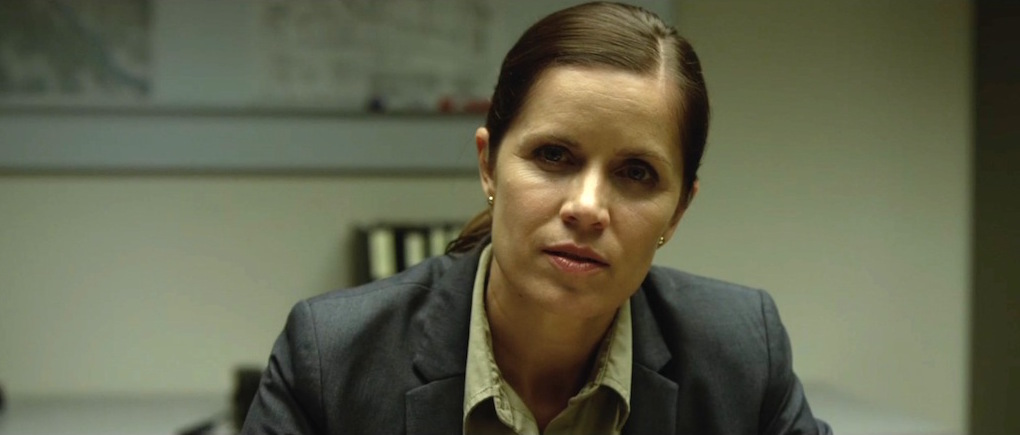Information. That’s the real object of David Fincher’s obsession. It’s the reason he keeps coming back to police procedurals. In a world flooded with information, it is the job of the detective to wade through the mess to find the truth: Mills and Somerset (Se7en), Toschi and Graysmith (Zodiac), Blomkvist and Salander (The Girl with the Dragon Tattoo), they all fulfill the job in some capacity. In Gone Girl, Fincher’s latest, this thankless task falls to Detective Rhonda Boney.
As played by Kim Dickens, Boney comes across as intelligent and empathetic. Like Fincher’s previous protagonists, she is meticulous and committed to her job. In many ways, she embodies the role of the prototypical Fincher protagonist but with one minor modification: she’s not the film’s protagonist. Gone Girl is not the story of a determined detective seeking the truth (like Zodiac or The Girl with the Dragon Tattoo). Instead, the film centers on the subjects of her investigation, Amy and Nick Dunne.
At the start of the film, “Amazing” Amy Dunne (Rosamund Pike), the woman who inspired a popular children's book series, has gone missing. Rapidly, the high-profile case attracts the attention of the media who immediately hunt for a suspect, stumbling upon Amy’s husband, Nick (Ben Affleck.) At first, Nick seems innocent and distraught, but Fincher soon reveals that he had been having marital difficulties and an affair. The media quickly jumps on this and starts calling for his head. To counter this perception, Nick gives interviews in which he paints himself as a bad man who nonetheless loves his wife, a move that wins him some sympathy in his community. In retaliation, Amy, who turns out to have framed her husband, places anonymous calls to the police that point to Nick’s guilt. Gone Girl is structured around Nick and Amy’s manipulation of information to forward their agendas, and, in most instances, their manipulations work. Boney’s partner, for example, buys entirely into Amy’s staged narrative of her disappearance and would like to arrest Nick with little evidence to save himself the trouble of working on the case. Boney, the only character who resists manipulation, is pushed to the sidelines.
As soon Fincher establishes that nearly all of his characters are either manipulative or subject to manipulation, Detective Boney, even though she does not get significant amounts of screen-time, becomes the only reliable surrogate through which the audience can view the film. Throughout, she is the only character who withholds judgement and looks for substantial evidence to carefully consider before accusing, let alone arresting, anyone. At first, she is hesitant to believe Nick was responsible for Amy’s disappearance, but at the same time, she knows that there is more to him than meets the eye and never comes to trust him completely. In the last part of the film, she becomes the sole crusader willing to question Amy’s shady captivity story and unlikely escape (which Amy invented to return home safely), but, in a sick twist of fate, no one onscreen acknowledges the truth she tries to pursue.
Like her idiot partner whose opinion constantly sways back and forth with that of the public, her superiors would rather believe in the story fed to them than to question the incongruities of Amy’s tale. Sadly, the hard work Boney puts into this hellish case ends up being for nothing. Kim Dickens’ resigned attitude in her final scene is heartbreaking. She’s not devastated or angered, she merely stops caring. In Fincher’s cruel world, only people like Amy, those who can dexterously manipulate information, succeed.
In the end, Gone Girl is not a tragedy because Nick is forced into a life with the psychopathic Amy; the two twisted souls deserve each other. The film is a tragedy because Boney, the only person equipped with uncovering the truth, gives up the fight. Her work of finding out the truth, revealing the real criminal (central to films like Zodiac and Se7en) has been marginalized. Boney accepts that the truth doesn't matter nearly as much as public opinion. In a world where people would rather turn away from reality than tarnish the pristine image of Amazing Amy and her perfect family, there is nothing she can do, and it is terrifying.
Verdict- 4/4
Gone Girl (2014) 2h 29min. R.
Random Thoughts
- Rosamund Pike, who plays Amy, has been doing great work for years now but has just now gotten the recognition she deserves. She's amazing, as always, but Kim Dickens is simply better this time around. For more of Pike's work check out her role as Bond Girl Miranda Frost in Die Another Day and Jane Bennet in Pride and Prejudice. - Watch Deadwood! Kim Dickens plays Joanie Stubbs.
- Ben Affleck never stopped being a great actor. Here's more proof.
- And Tyler Perry shows up as a crooked lawyer who turns out to be the character with the most integrity because this is a David Fincher film.
- Neil Patrick Harris is in here too. This movie is a treasure trove of incredible actors.








































